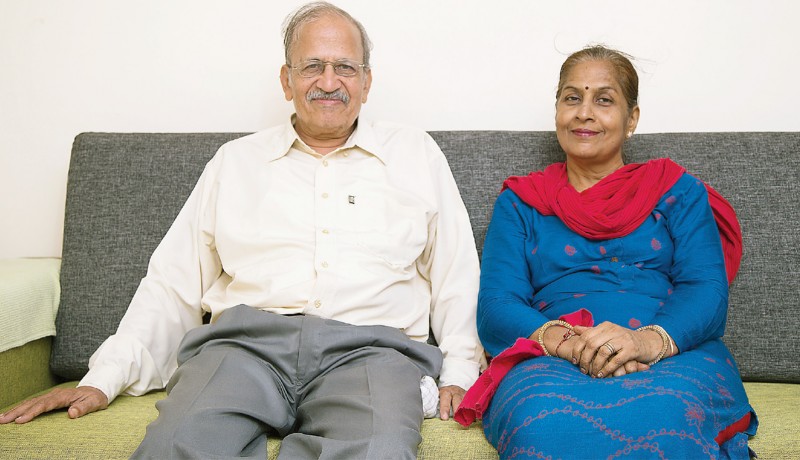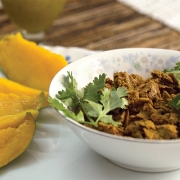
Columns

A series by Pratibha Jain about silvers who believe nurturing the body and mind is the key to joy.
Featuring Sunanda & Surendra Singh Pokarna from Ahmedabad
Last month, I received an SMS from my sister-in-law Indu Chordia: “Come home, I want you to meet a very special couple and yes, be prepared to speak in pure Rajasthani.” I laughed to myself, but agreed. Even though I grew up as a purist and never liked mixing languages while speaking, things are quite different now. I tend to use a mix of languages, lapsing into English, Hindi and Rajasthani with ease during a conversation. Invariably, I end up speaking in ‘Hinglish’, even though it’s the last thing I would like to do!
It was indeed refreshing to meet 62 year-old Sunandaji and Surendra Singh Pokharna, 67. This Rajasthani couple from Ahmedabad consciously choose to speak in Rajasthani whenever possible. As if contagious, I found myself doing the same!
Listening to them speak, I heard the same thoughts being echoed by both: his being influenced by his scientific point of view; hers by her simple, humane and existential viewpoint. Both expressed the need for harmony, coexistence, and the need to commune with nature. I could see how much they had influenced and inspired each other. Time came to a standstill as I savoured the jugalbandi of their melodious conversation.
IN THEIR OWN WORDS
She: I was born and brought up in Bengaluru. Having been academically inclined, I was keen to pursue law after my graduation, but my parents got me married in 1978. We initially lived in Udaipur and moved to Ahmedabad in 1986; we are living here since. Both of us belong to families where education was always a matter of prime importance.
He: I grew up in Udaipur. I did my PhD in physics, post-doctoral in biophysics and MSc in operations research. I worked as a scientist at ISRO [Indian Space Research Organisation] for 19 years. After that, I worked as a CEO in a private company. I took VRS and now enjoy working as a consultant. We have recently started an organisation in Ahmedabad to conduct research in the disciplines of science and spirituality.
A HEALTHY CURIOSITY
He: I was always curious about things around me. Religion fascinated me and I wanted to know why my mother undertook religious fasts, why Jain monks wear only white, why we should visit temples, and many such questions. I found answers to many, and am still seeking many more. For instance, I realised that, for my mother, fasting was not a state of abstinence but a deep spiritual pursuit. It allowed her to behave and work in the same manner even on the days she was fasting. Regarding the white robes of the monks, I later understood that white reflects a balance of all the colours in the spectrum; it is reflective, and is infused with the qualities of serenity and peace. Once you wear white, all colours are there in your clothes from one point of view and none from the other; hence, it will have a direct repercussion on the pollution caused owing to the use of hundreds of chemical colours.
She: I agree with him; it is important to cultivate jigyasa in life; it is the first rung on the ladder of knowledge and learning. Curiosity is a healthy quality to grow up with as it allows you to seek and find knowledge and evolve as a human being, ignites sensitivity and, eventually, leads to karuna or compassion in the heart.
COMPASSION, A WAY OF LIFE
He: She is blessed with a rare sensitivity. Anyone who comes to our doorstep is treated equally and with respect. Even the postman and sweepers will be offered a glass of water. I feed about a dozen street dogs every morning and you should see how they wait for me! It is only after this routine that I return, have a bath and partake of food.
She: I abhor casteism. I cannot bear to see people suffering. I am always wondering how we can help people move from misery to happiness. We do whatever we can in our own way. For instance, I never throw away the peels and seeds from my kitchen. I give them to him the next morning. After his morning yoga and prayers, he goes out to feed the cows chaara along with the peels and seeds.
HARMONY AND COEXISTENCE
He: Life is all about coexistence. It is about ‘we’ and not just ‘me’. I was always keen to combine science and spirituality. We need to look at science, technology, economics and environment as a totality. We need to move from reductionism to wholeness. Coexistence makes life all-inclusive and, consequently, more peaceful. Hence, we are trying to persuade people to celebrate International Non- Violence Day on 2 October, the birth anniversary of Mahatma Gandhi, as declared by the UN in 2007.
She: We both follow ahimsa and compassion as principles in everyday life. We feel this is the only way to create harmony and eventually make the world a better place. My father was my inspiration! He inculcated in me the love for reading and being well-informed.
He: My father-in-law was an exceptional man, very broad-minded, educated and practical. We both learnt a lot from him.
LINGUISTIC PASSION
She: When we moved to Ahmedabad, we realised that most people from other communities spoke in their own mother tongue, but we Rajasthanis were gradually drifting away from speaking in our dialect. We felt a strong need to do something to rekindle interest in our mother tongue.
He: Rajasthani is a truly rich and beautiful language with 250,000 unique words. I inherited the love for the language from my mother. She knew more than 1,000 lokgeet and sang beautifully with a song for every mood and occasion. We started an organisation in 2012 to promote Rajasthani language and culture [Rajasthani Bhasha aur Sanskriti Prachar Mandal, Ahmedabad]. We also launched a dedicated website [www.aapanorajasthan.org] in Rajasthani and created a Rajasthani calendar. We invite Rajasthani families to become members and celebrate the true spirit of Rajasthan.
HANDY KITCHEN TIPS
He: I am a scientist by profession, yet when I see her operations in the kitchen, I am always amazed by her systematic and methodical approach. She is extremely active, meticulous and organised.
She: He likes organising his files and I do the same in the kitchen. Developing good routine habits pays dividends in the long run. The priority in any kitchen should be to preserve the ingredients well. I get most of my spices ground specifically from Pali village in Rajasthan once a year and preserve them meticulously. Here are some tips. To preserve chilli powder, add a little bit of any oil, preferably castor oil (erandi ka tel) or asafoetida chunks. To preserve turmeric, add a little salt and bits of plain white paper. Cut the paper into 1-inch squares and roll tightly. Just go on inserting these into the turmeric powder. In a 1-kg jar, I would add around 15 bits of paper. It absorbs moisture and keeps the turmeric dry and good for years. Add cloves (laung) to coriander powder for a longer shelf life. To preserve wheat, add 1 kg castor oil to 100 kg wheat. Rub a few drops of oil to every handful of wheat. Continue this with the entire sack of wheat. Actually, these are simple tips followed in most Gujarati homes.
UNEXPECTED GUESTS
He: She manages beautifully even when unexpected guests drop by. Most people might get nervous but nothing fazes her!
She: Every kitchen has enough ingredients to whip up something in a hurry. My kitchen and fridge are always well-stocked. I enjoy cooking and never feel nervous even when there are sudden guests. As a child, I pitched in with the housework. I was all of 10 when my mother fell ill after my youngest brother was born. I used to do the housework, send my younger siblings to school, take care of my mother and attend school.
TOGETHERNESS IS…
She: If you ask me whether he helps in the housework and can cope on his own, my answer would probably be ‘No!’ He is too busy with his pursuits. What makes a real difference is that he is always appreciative of what I do. That, to me, spells togetherness!
He: [Laughs] There has never been a reason for me to manage all by myself. Even when she visits her maternal family, we go together.
She: Now that we are free of our responsibilities, I don’t want to save money. I would rather save happiness. I would like to travel more often. I want to see more places across the globe.
THEN AND NOW
She: What I liked about earlier times was the close family ties. We had such fun playing outdoors. Where did that simple fun and joy disappear? Today, most children are glued to their mobile or busy with endless classes. Instead of trying to burden them with so many things, why don’t we teach them to pursue just one hobby, and pursue it well?
He: We always grew up with a certain order, simplicity and discipline. Whether it was a working day or a holiday, we woke up at the same time every day. But today a child is facing a lot of uncertainties that tend to create indiscipline. It appears entropy rules our life now. By entropy, I mean the degree of disorder and randomness in all walks of life. Today’s youth faces tough competition in all fields. And whether it is studies, television channels or gadgets, they are faced with endless options, which can be disturbing. The more we are technologically advancing, the more entropy is increasing in the biosphere. This disturbs our children and, perhaps, leads to not following any discipline. I believe the answer lies in leaning towards spirituality. It will help us move towards an orderly state of mind and life.
I came back overawed by their simple home truths! Here was a couple perfectly made for each other—a marriage of minds, thoughts and deeds. Their capacity to move forward, evolve and flower lies deeply rooted in the pride they take in their culture, language and roots. In fact, my takeaway from this interview was a strong commitment to myself, to speak in my mother tongue as often as I can.
MANGO-PEEL SABZI
(A side-dish with peels of ripe mangoes)
Here is an unusual creation from peels of ripe mangoes. Sunandaji says that the kesar variety is the most popular in Ahmedabad. The fruit is so succulent and tasty that she did not want to waste even the peels. However, you can use the peels of other mango varieties as well. Wash the mangoes well and then peel them. Chop the peels into neat squares and sun-dry for a few days. In summer, the sun is so fierce that they dry within a day or two. Once dried, they can be preserved and stored in an airtight container for months.
Ingredients
- Dried mango peel: 1 cup; chopped into small squares
- Oil: 2 tbsp
- Mustard seeds: ¼ tsp
- Cumin seeds: ¼ tsp
- Dry whole Kashmiri red chillies: 2; broken into pieces
- Asafoetida: ¼ tsp
- Turmeric powder: ¼ tsp
- Chilli powder: 1½ tsp
- Coriander powder: 2 tsp
- Dried mango powder (amchur): 1 tsp
- Salt to taste
Method
Soak 1 cup of mango peel bits overnight. Next morning, pressure cook with 2½ cups of water for 2 whistles. Allow the steam to escape before opening the lid. Drain the water fully and keep aside. Heat the oil in a broad pan and add the mustard and cumin seeds. As the mustard splutters, add the asafoetida and red chillies. Add the cooked mango peels, turmeric powder, chilli powder, coriander powder, dried mango powder and salt. Cook on a medium flame for 5 minutes, stirring occasionally. Switch off the flame. Serve hot with rotis.
Pratibha Jain, an author and translator from Chennai, is the co-author of two award-winning books Cooking at Home with Pedatha and Sukham Ayu. Her area of specialisation is documenting Indian traditions through research, translation and writing
Photos: Madhavi Jhumarwala Featured in Harmony — Celebrate Age Magazine August 2017
you may also like to read
-
Mental workout
Mukul Sharma tells you how to keep those grey cells ticking Everyone will ultimately lose his or her brain….
-
Helpline
Dr Harshbir Rana answers your queries on personal and social issues related to ageing, elder care and intergenerational relationships ….
-
Off the cuff
Raju Mukherji pays tribute to his first hero, Tenzing Norgay, an exemplary mountaineer Darjeeling, 1955. Dr ‘Pahari’ Guha Mazumdar….
-
Yoga RX
Shameem Akthar shows ways to control debilitating ankle pain through regular practice Ankle pain is so common and prevalent….








